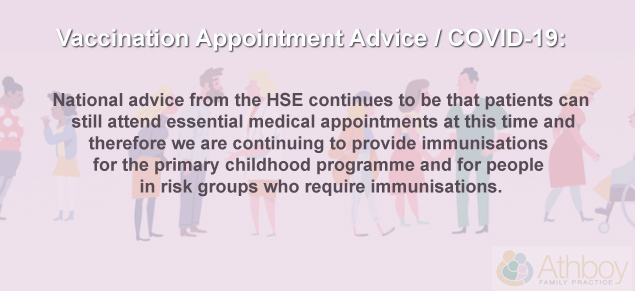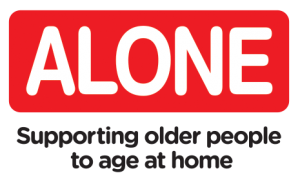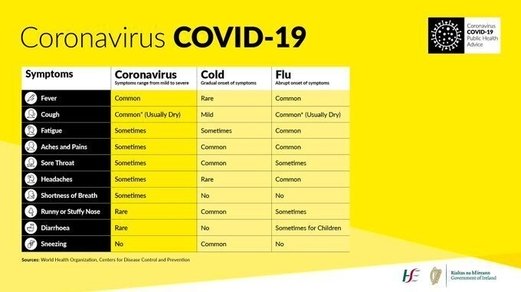31st March 2020
Vaccination Appointment Advice / COVID-19

29th March 2020
COVID-19 Support Line for Older People

ALONE has launched a national support line and additional supports for older people who have concerns or are facing difficulties relating to the outbreak of COVID-19 (Coronavirus). Professional staff are available to answer queries and give advice and reassurance where necessary. The support line is open seven days a week, 8am – 8pm, by calling 0818 222 024.
28th March 2020
Heart and stroke presentations in Irish hospitals have fallen in recent weeks due to public concerns
The Irish Heart Foundation has expressed concern that people experiencing symptoms of heart disease and stroke are not presenting at hospital due to concerns about the coronavirus and not wanting to burden the healthcare system.
Anyone experiencing symptoms of a stroke or heart attack should follow the normal protocol and call an ambulance without delay.
You can read the complete article from the Irish Heart Foundation by clicking here.
27th March 2020
STAY AT HOME
People urged not to leave their homes
The Taoiseach, Leo Varadkar, and Minister for Health, Simon Harris, have issued strict guidelines for people to stay at home from midnight tonight (Friday).
The main rule is to STAY AT HOME. The only times you can leave your home are:
- to travel to or from work if you are providing an essential service.
- to shop for food
- to collect medical prescriptions and medical supplies and attend medical appointments
- to carry out vital services like caring (including family carers)
- for brief individual exercise – within 2 kilometres of your house. (You can bring children but must keep 2 metres away from others for social distancing)
- for farming
You should ring the surgery to be assessed for a test if you have a fever (high temperature – 38 degrees Celsius or above) or chills and one of the following symptoms:
- a cough – this can be any kind of cough, not just dry
- shortness of breath
- breathing difficulties
26th March 2020
Coronavirus testing update –
The National Public Health Emergency Team, as of 24th March 2020, has adopted the World Health Organisation case definition for COVID-19
Patients will have to show fever and at least one sign of respiratory disease – such as cough or shortness of breath – before they can be referred for testing. Patients will also have to fall into a priority group in order to be tested.
Key message:
From today it is important to focus on a new key message. If you have respiratory symptoms you have to self isolate for 14 days. It is important not to focus on the COVID-19 test. The intervention to stop the virus spreading is for patients to self isolate. People in the household will also need to restrict their movements for 14 days only going to shops or pharmacy as necessary. Or if a test is arranged for the case, until the test has reported negative – whichever is sooner.
The treatment for COVID_19 is rest, fluids and paracetemol if you have a fever, aches and pains. While we understand you would like to know for definite whether you have COVID-19 or not, the country is in the middle of a major public health crisis and now we need to focus on testing:
- Those who are more at risk of the more severe form of COVID-19 so we can monitor them carefully
- Healthcare Workers so we can keep them at the front line
- Facilities / Environments where there is a risk of an outbreak among vulnerable people such as in a nursing home
You will need to self-isolate while you wait for your test. The people in your household will need to restrict their movements.
Further information in the form of FAQs are available by clicking here
25th March 2020
Coronavirus testing update –
You should ring the surgery to be assessed for a test if you have a fever (high temperature – 38 degrees Celsius or above) or chills and one of the following symptoms:
- a cough – this can be any kind of cough, not just dry
- shortness of breath
- breathing difficulties
You will need to self-isolate while you wait for your test. The people in your household will need to restrict their movements.
23rd March 2020
Minding your mental health during the coronavirus outbreak
Infectious disease outbreaks like coronavirus (COVID-19), can be worrying. This can affect your mental health. Click this link for many things you can do to mind your mental health during times like this.
21st March 2020
Social distancing: How far is 2 metres?
17th March 2020
SYMPTOMS FOR CORONAVIRUS

15th March 2020
IF YOU HAVE ANY RESPIRATORY SYMPTOMS PLEASE DO NOT ATTEND THE PRACTICE.
PLEASE RING THE PRACTICE AND YOUR CALL WILL BE TRIAGED
IF YOU HAVE BEEN IN TOUCH WITH THE PRACTICE AND BELIEVE YOU MAY HAVE COVID 19 PLEASE CLICK THIS LINK – YOU MUST UPDATE AND CONFIRM WITH THE PRACTICE YOUR UP TO DATE MOBILE PHONE
15th March 2020
How to properly wash your hands:
9th March 2020
All Patients ringing to book an appointment with the surgery will be asked if appointment is for review or existing respiratory condition (fever, cough or shortness of breath) and if so, they may have to speak with a Nurse or Doctor prior to being given an appointment. This measure is being introduced to protect vulnerable patients and our staff.
6th March 2020
HAVE YOU OR ANY MEMBER OF YOUR FAMILY TRAVELLED TO OR FROM CHINA OR ANY OF THE AFFECTED COUNTRIES IN THE LAST 2 WEEKS?
IF SO, PLEASE DO NOT ATTEND THE SURGERY AND RING FOR ADVICE.
ALSO, FROM NOW ON THERE WILL BE NO WALK-IN APPOINTMENTS AND NO WALK-IN SURGERY ON WEDNESDAY MORNINGS. IN ALL CASES PLEASE RING FOR APPOINTMENT.
Coronavirus information from HSE website
(Contains links to external websites)
What to do if you think you’re at risk of COVID-19 (Coronavirus)
The following areas are affected with a spread of COVID-19 (Coronavirus):
- China
- Hong Kong
- Singapore
- South Korea
- Iran
- Japan
- Italy: the regions of Lombardy, Veneto, Emilia-Romagna, and Piedmont
The risk of catching COVID-19 (Coronavirus) in Ireland is still low to moderate. This may change. However, most people may continue to go to work, school and other public places, as usual.
If you have been in close contact with a confirmed case of COVID-19 (Coronavirus), a public health doctor will tell you this.
If you are not feeling well
If you have been to one of the places listed above in the last 14 days and you are not feeling well, check if you have symptoms of COVID-19 (Coronavirus).
These are:
- fever (high temperature)
- cough – this can be any kind of cough, not just dry
- difficulty breathing
If you do have symptoms of COVID-19 (Coronavirus), you should phone your doctor or emergency department (ED) immediately.
Do not visit a doctor or ED. Phone them first. This is so you do not accidentally put other people at risk. If you do not have a doctor, phone 112 or 999.
Tell them about your symptoms. Let them know you have been to a country or region with a spread of COVID-19 (Coronavirus).
If your doctor thinks that you need to be tested, they will tell you where the test will be done. They will also tell you when to expect results.
Avoid contact with other people by self-isolating.
If you are feeling well
If you have been to one of the places listed above and are feeling well, carry on with your normal routine.
Follow the advice on how to protect yourself from COVID-19 (Coronavirus) and other infections such as flu.
Avoid spending time with people that are ill with a cough, high temperature, or breathing problems.
If you develop symptoms of COVID-19 (Coronavirus):
- avoid contact with people by self-isolating
- phone your doctor or emergency department
- tell them your symptoms and let them know you have been to a country or region with a spread of COVID-19 (Coronavirus)
Read advice from the HSE on what to do if you’ve been in an affected area.
If you think you have been in contact with a confirmed case of COVID-19 (Coronavirus)
Visit www.hse.ie if you think you have been:
- in contact with someone confirmed as having COVID-19 (Coronavirus)
- to a healthcare facility in another country where COVID-19 (Coronavirus) patients are being treated
You will be put in contact with your local Department of Public Health staff who will give you information and advice.
If you develop symptoms of COVID-19 (Coronavirus), avoid contact with people by self-isolating and phone your doctor or emergency department.
Interpreting service for deaf people
Deaf people can contact HSE Live using Irish Remote Interpreting Service (IRIS).
IRIS is available from 9am to 7pm, Monday to Friday and 10am to 4pm on Saturday.
To access the service using Irish Sign Language, book an appointment online or email [email protected]
Symptoms
It can take up to 14 days for symptoms of COVID-19 (Coronavirus) to show.
The most common symptoms of the virus are:
- a cough – this can be any kind of cough, not just dry
- shortness of breath
- breathing difficulties
- fever (high temperature)
More information on symptoms of COVID-19 (Coronavirus) is available from the HSE.
How COVID-19 (Coronavirus) spreads
COVID-19 (Coronavirus) can be spread:
- directly, through contact with an infected person’s body fluids (for example, droplets from coughing or sneezing)
- indirectly, through contact with surfaces that an infected person has coughed or sneezed on and which are, therefore, contaminated with the virus
As it is a new virus, we do not know how easily the virus spreads from person to person. We do not know if someone can spread the virus before they show symptoms.
The virus may only survive a few hours if someone who has it coughs or sneezes on a surface. Simple household disinfectants can kill the virus on surfaces. Clean the surface first and then use a disinfectant.
COVID-19 (Coronavirus) is spread through close contact with an infected person. A close contact involves either face-to-face contact or spending more than 15 minutes within 2 metres of an infected person. Close contact does not include someone you passed on the street or in a shop. The risk of contact in that instance is very low.
More information on how COVID-19 (Coronavirus) spreads is available from the HSE.
How to protect yourself
To protect yourself:
- wash your hands frequently with soap and water or use an alcohol-based hand rub if your hands are not visibly dirty
- practice good respiratory hygiene, that is, when coughing and sneezing, cover your mouth and nose with flexed elbow or tissue – discard tissue immediately into a closed bin and clean your hands with alcohol-based hand rub or soap and water
- maintain social distancing, that is, leave at least 1 metre (3 feet) distance between yourself and other people, particularly those who are coughing, sneezing and have a fever
- avoid touching your eyes, nose and mouth – if you touch your eyes, nose or mouth with your contaminated hands, you can transfer the virus from the surface to yourself
For people working with the general public who are feeling well and do not have respiratory symptoms (for example, cough, fever, shortness of breath), facemasks are not recommended. There is no evidence that using masks in this setting is of any benefit to people who are not sick.
The most important action we can take to protect ourselves from COVID-19 (Coronavirus) is regular hand-washing and good respiratory hygiene.
Read a step-by-step guide from the HSE on how to clean your hands.
Treatment
There is no specific treatment for COVID-19 (Coronavirus). However, many of the symptoms of the virus can be treated.
Supportive treatments, like oxygen therapy, can be given while your own body fights the virus. Life support can be used in extreme cases.
If you get the virus, your healthcare professional will advise treatment based on your symptoms.
Antibiotics do not work against COVID-19 (Coronavirus) or any viruses. They only work against bacterial infections.
There is currently no vaccine to treat or protect against COVID-19 (Coronavirus).
The flu vaccine does not protect against COVID-19 (Coronavirus).
More information on treatment is available from the HSE.
Travel advice
Follow up-to-date travel information from the Department of Foreign Affairs and Trade for travel advice on countries and regions affected by COVID-19 (Coronavirus).
Specific travel information is available for areas affected with a spread of COVID-19 (Coronavirus):
Irish citizens who are abroad, or who intend to travel abroad in the near future and have concerns about COVID-19 (Coronavirus), can ring the department’s dedicated phone line: +353 (0) 1 613 1733
Go to Latest Covid-19 Updates
#covid19

